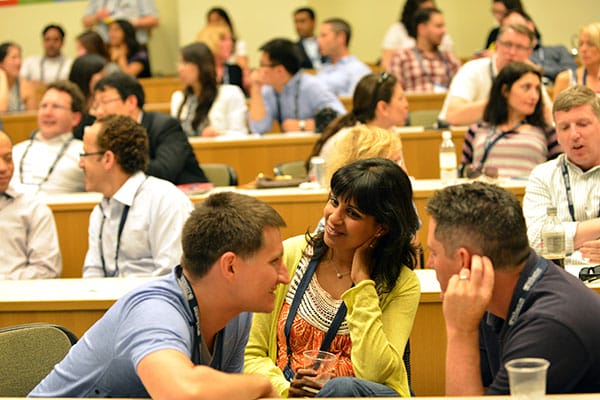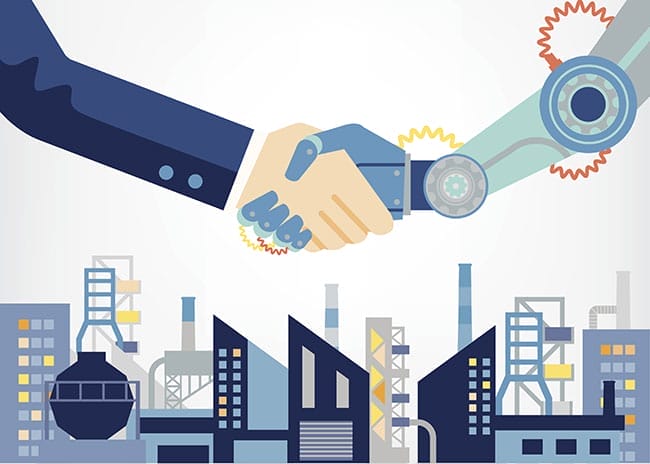During their lifetime, today’s Wharton students will help shape, and be impacted by, an economy where most of the work and productivity for society’s goods and services will be performed by all types of robots, platoons of which will outnumber humans in the workforce.
Whether you read Derek Thompson’s recent “World Without Work” in The Atlantic, or David Rotman’s “Who Will Own the Robots” in the July/August edition of MIT Technology Review, the forecast for the not-so-distant future is the same: We will eventually have an economy in which robots will outnumber, or even possibly replace, humans in the workplace.
Today’s entrepreneurial Wharton graduates are caught in a Catch-22: their knowledge and skills will lead to replacing workers with robots to sustain the productivity required for our gross domestic product but leave humans (and possibly themselves) without work. The result is that our consumer-based economy will have to contend with the majority of consumers having no income.
The implication of this probability is a social, economic and political tsunami. So much so that 17 of the nation’s leading technologists consider this a crisis. In a recently published “Open Letter on the Digital Economy” in the July/August edition of MIT Technology Review, they conclude:
“In summary, we believe that the digital revolution is delivering an unprecedented set of tools for bolstering growth and productivity, creating wealth and improving the world. But we create a society of shared prosperity only if we update our policies, organizations and research to seize the opportunities and address the challenges these tools give rise to.”
Most of the authors who write about the near future’s workerless economy forecast a reshaping of our economy to provide income to nonworking humans. Suggestions range from expanding economist Milton Friedman’s (and President Richard Nixon’s) idea of a “negative income tax” to community profit-sharing in the productivity of robots. Rotman comes to a similar conclusion:
“Whoever owns the capital will benefit as robots and AI [artificial intelligence] inevitably replace many jobs. If the rewards of new technologies go largely to the very richest, as has been the trend in recent decades, then dystopian visions could become reality. But the machines are tools, and if their ownership is more widest shared, the majority of people could use them to boost their productivity and increase both their earnings and their leisure. If that happens, an increasingly wealthy society could restore the middle-class dream that has long driven technological ambition and economic growth.”
If one thinks today’s political tug of war over how to shape our economy has been agonizing, just wait. Wharton graduates will have to become personally involved in disrupting our economic model if it wants to have consumers of goods and services in a “country without workers.”
But the tug of war to reshape our form of capitalism to meet the robotic age will be mild compared to the perceived assault on our embedded religious-cultural concept of work as the center of life. In essence, most of us feel that if you don’t have a job, you’re a bum or a welfare cheat.

Did Socrates have the answer to a work-free, robot-filled world?
Yet the purpose of life is “eudomony,” or happiness, as we learn from Socrates’ writings centuries ago to the predictions of modern management sciences pioneer Stafford Beers. Combine that thesis with Johan Huizinga’s concept that play and leisure are the traditional centerpiece of life, and you set the stage for a national debate about why work plays a central role, particularly if robots can replace humans.
There is literally no limit on the forms of play and leisure that humans engage in. The Greek word for leisure is scola, which does not separate education and learning from leisure, recreation and play. It turns out this is a multifaceted and unappreciated concept that most likely will expand and develop if robots take over the workplace. This comprehensive view of scola is a starting point for reshaping our economy where robots produce the GDP to sustain our society, permitting a larger portion of our population to fashion a new role and purpose for itself. Perhaps we need to shift to ”community schools,” which during the day are run by educators, but in the evening operated as a collaborative effort by leisure, education, art, health and community organization professionals.

A lot more leisure and learning could be in our future.
There was a precedent for an economy where workers had no work, as Thompson noted, with over 30 percent of the population without jobs during the 1930s. Several programs were initiated to channel those receiving public compensation into arts, conservation, environmental and cultural projects, which had a lasting impact and improvement on our society and ultimately shaped the lifetime careers of most of those involved. Today, “leisure” pursuits for many people who make jewelry, pottery, paint and collect coins are a source of revenue to support and enhance their leisure-focused life.
A robot-based economy could finally free humans to pursue a more meaningful and engaging life based on different aspects of scola. This is particularly important when reflecting on Barry Schwartz’s Aug. 28 New York Times opinion piece titled “Rethinking Work,” in which he notes, citing Gallup research, that almost 90 percent of workers were either “not engaged” with or “actively disengaged” from their jobs and that nine out of 10 workers “spend half of their waking lives doing things they don’t really want to do in places they don’t particularly want to be.”
There are competing models for the future economy other than that of a workerless one. “Welcome to the Third Industrial Revolution” by Jeremy Rifkin W67 in the Summer 2015 issue of Wharton Magazine offers an alternative economic future, one in which:
“Millions of people are already transferring bits and pieces of the economic life to the global ‘Collaborative Commons’ … ‘Consumers’ entering in a ‘sharing economy’ and becoming ’prosumers’ who are producing and sharing their own information, entertainment, green energy and 3-D printed goods at near zero marginal cost.”
Today’s Wharton classes are a generation of destiny. Given future competing, disruptive economic models, class members have the necessary smarts and tools to refashion our economy and society. The real issue is whether the traditional cultural/economic straight jacket of holding down a “real job” will be too big of a hurdle? Or will our undergrads’ and MBAs’ preparation for innovation and creativity pay off with meaningful results and a reimagining of our centuries-old cultural values and economic model?
What a wonderful challenge for launching a career.

























